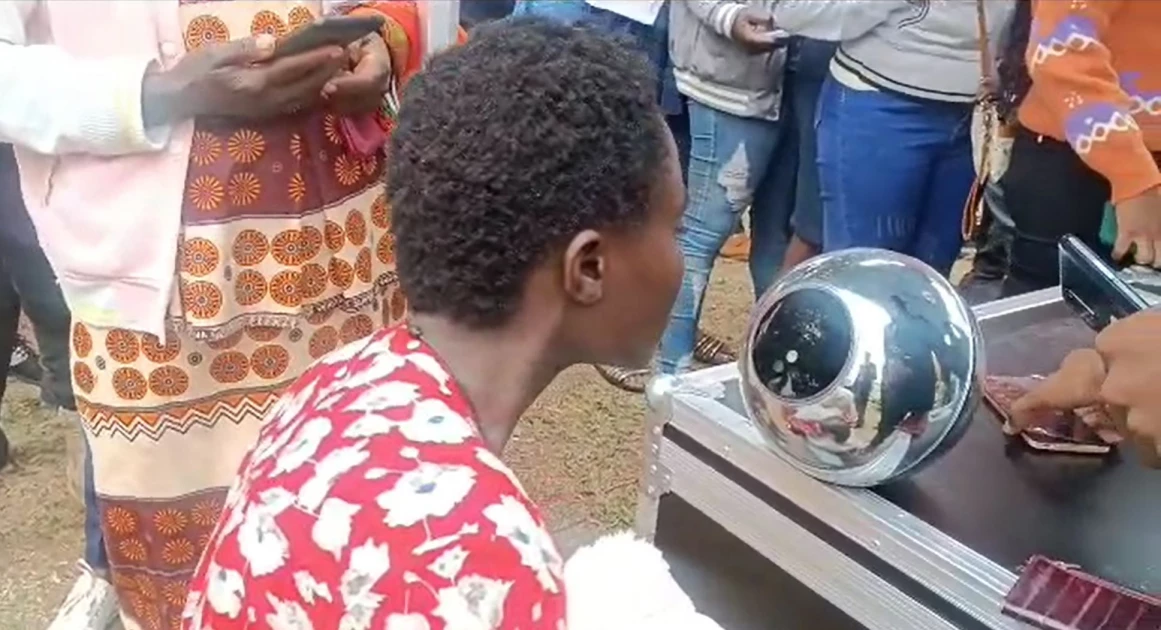What personal data does Worldcoin collect from you?

A video screengrab of a Kenyan getting their eye scanned to register for Worldcoin at the KICC grounds in Nairobi on Tuesday, August 1, 2023.

Audio By Vocalize
The internet has for the past seven days
been awash with excitement about Worldcoin,
the new cryptocurrency project by Sam Altman, the owner of US generative Artificial
Intelligence (AI) company OpenAI.
The company said that the
crypto project, which was launched globally last week has seen over
350,000 Kenyans registered, a process involving scanning one's eyeballs
through an orb in exchange for a digital identity called World ID.
Despite data security and privacy concerns internationally and locally, Kenyans flocked to shopping malls and other outlets where registration was taking place in Nairobi to get their irises scanned for 25 free cryptocurrency tokens known as WLD.
The government on Wednesday halted all activities associated with the cryptocurrency project over data security concerns.
But on its
part, OpenAI has maintained user data is secure with the
crypto project, with the option to delete or have it stored in an encrypted form.
But
first, what data does Worldcoin collect from a user upon signing up?
On its website, Worldcoin says it does
not fetch personal data from users when they download the World App – personal
data, in this case, being name, phone number and address.
“Individuals who want to receive a World
ID are not required to share their name, phone number, email address, or home
address. Images collected by the Orb are used to generate a unique iris code,”
says the company.
It adds that the images are “by default”
immediately deleted once the iris code is created unless the user opts into
Data Custody, in which case the probability and frequency of the user’s need to
reverify their World ID decreases as the iris code algorithms change.
“The World ID sign-up process is only
intended to verify an individual’s uniqueness - i.e., that they have not
previously signed up and received a World ID,” adds Worldcoin.
Users may choose to share additional
data, but the company says it is not a requirement. This includes an email
address to sign up for the Worldcoin newsletter.
The project
says any personal data shared with them is encrypted “in transit and at rest.”
“The
Worldcoin Foundation and its contributor Tools for Humanity do not and never
will share any personal data (including biometric data) with anyone who is not
working on or assisting with the Worldcoin project,” it says, adding that this also applies
to selling data.
Additionally,
Worldcoin says it never collects any biometric data from any user without that
user’s explicit consent, something ICT Cabinet Secretary Eliud
Owalo alluded to when asked about the legality of the company’s
operations in Kenya on Wednesday.
Owalo said the
government through the Office of the Data Protection Commissioner (ODPC) has
had several meetings with Wordcoin before they began local operations to
discuss the data safety implications of their operations.
“Their argument is that
they are getting the data voluntarily from Kenyans,” the minister told NTV in
an interview.
The Data Protection Act
stipulates that a data subject has a right to be informed of the use to which
their personal data is to be put; to access their personal data in the custody
of a data controller or data processor, and to object to the processing of all
or part of their personal data.
Additionally, a data
controller or data processor shall collect personal data directly from the data
subject, or indirectly where the data is contained in a public record and the
data subject has deliberately made the data public.
The government suspended all activities linked to the crypto
project in the country to pave the way for a probe by “relevant security,
financial services and data protection agencies” into Worldcoin’s authenticity and legality.
Another
place the project has raised eyebrows over data security is Europe, where for
EU member states, the General Data Protection Regulation (GDPR) regulations are
known to clamp down on tech giants.
Earlier
this week, the United Kingdom’s Information Commission Office said it
would be “making enquiries” about Worldcoin, while France's privacy watchdog
CNIL said the legality of the project’s biometric data collection
"seems questionable".


Leave a Comment